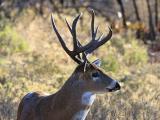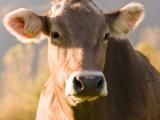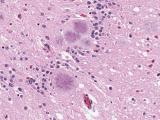Apr 4, 2007 (CIDRAP News) Canada recently released a report on the investigation of its ninth case of bovine spongiform encephalopathy (BSE), or mad cow disease, the first case of 2007.
The case was in a 79-month-old bull from an Alberta beef farm, according to an investigation report released Mar 26 by the Canadian Food Inspection Agency (CFIA). The bull was born in 2000, about 3 years after Canada banned the use of cattle protein in feed for cattle and other ruminants in 1997.
The agency said the bull died sometime between Jan 20 and 22 after becoming emaciated over the course of the winter. A private veterinarian determined the bull met the inclusion criteria for Canada's National BSE Surveillance Program, and forwarded brain samples for testing. BSE was confirmed on Feb 7 at the National BSE Reference Laboratory in Lethbridge, Alberta.
The animal's carcass was transferred to the Alberta Agriculture and Food laboratory, where it was burned. The report said none of it entered the human food supply or animal feed chain.
The bull was born on the farm, and its birth and feed cohort consisted of 593 animals. Investigators had traced 518 of the cohort so far and hoped to finish tracing the remaining 75 animals by the end of March.
Fifty-seven of the animals remaining on the farm were under quarantine until officials decide when to destroy them, the report said. Their carcasses will be excluded from the food and feed chains.
In a study of the feed the animal was exposed to on the farm, officials found no direct link between specific products or production practices that carried a risk of cross-contamination. However, they found that the bull was exposed to feed from facilities that have handled material banned from cattle feed.
These facilities were supplied by the same rendering plant that has been identified in previous BSE probes, the report said. It also said investigators could not rule out the possibility of cross-contamination when the feed was transported.
Canadian officials said the latest BSE case is not unexpected and still reflects an extremely low level of BSE in the country. Of 150,000 cattle tested since 2003, only 9 have tested positive for BSE, the report noted.
The United States banned imports of Canadian cattle and beef after Canada's first BSE case in May 2003. The border was reopened to boneless beef from young cattle a few months later, but live cattle were banned until July 2005, when officials reopened the border to cattle intended for slaughter before reaching 30 months of age.

















